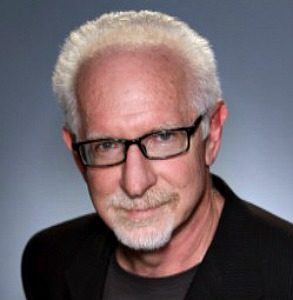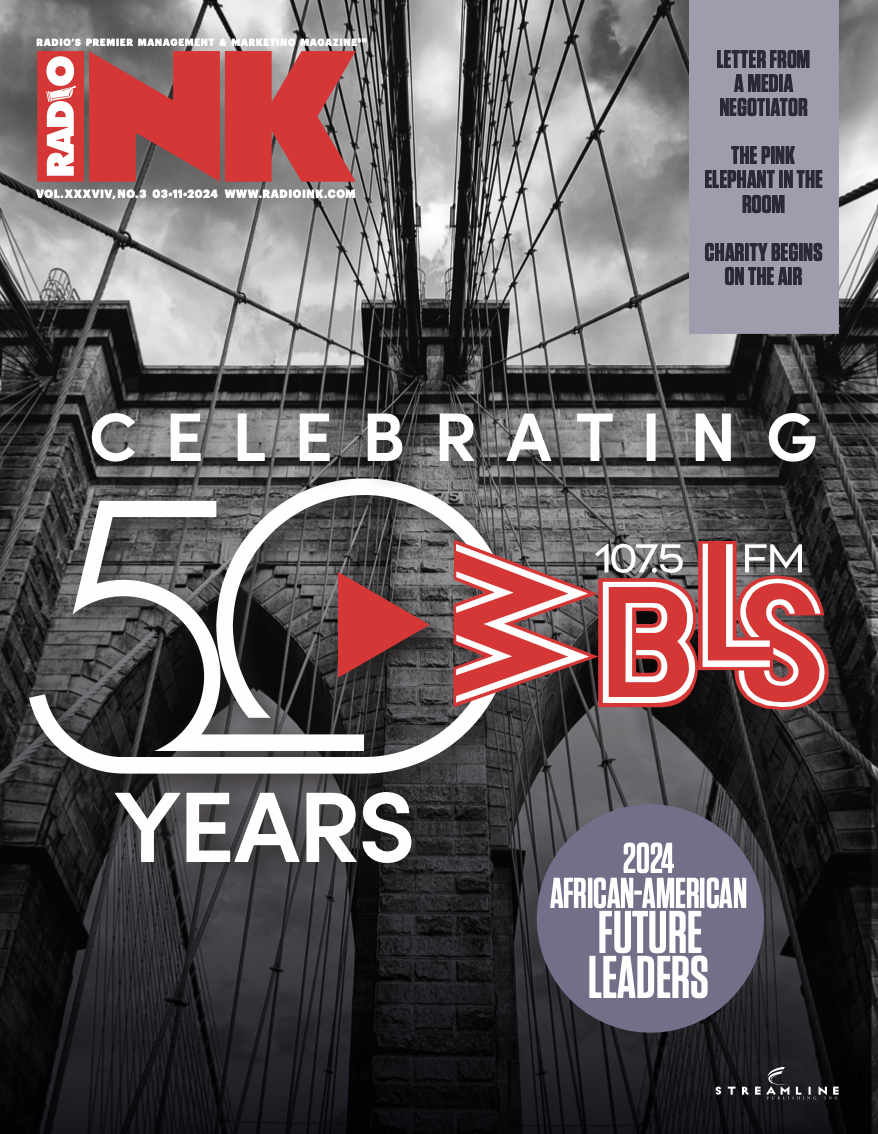
For one of the most iconic radio brands a major market has ever seen, there was no week-long walk down memory lane. There was no reminiscing about how the jocks of old broke barriers and broke rules to produce great content. There were no rock star interviews about how much the station meant to them back in the day. There was just a memo and a flick of the off switch. Poof. Gone.
The station that signed on in March of 1977, signed off in March of 2018. It did alter the format over the years, flirting with Talk and AC in the ’90s, and several variations of rock after that. So, what happened to The Loop? How did WLUP go from being on top of the radio world to the graveyard of discarded call letters?

John Sebastian, one of radio’s great programmers, consulted The Loop at one time and tells Radio Ink he installed his kick ass Rock and Roll format there in the early ’80s. “I have a special place in my heart for this radio station and the city of Chicago. WLUP failing highlights a microcosm of the ‘devolving’ of radio. It changed ownership way too often, changed formats too many times destroying their heritage rock image and, like most radio stations in America, suffered from a severe lack of financial support needed for the station to remain competitive. It’s sad. But it’s a heartbreaking commentary on the state of radio.”

Another one of radio’s greatest programmers Lee Abrams, not only consulted WLUP, he hired Steve Dahl in 1978 when the station was owned by Cecil Heftel. Abrams says the reason WLUP did not survive is because it did not evolve. “1978, their creative peak, was 40 years ago, and like so many ‘heritage’ stations they failed to aggressively evolve and have been on autopilot for quite some time. Their years of ownership changes complicated things.”

Jacobs Media Strategies President Fred Jacobs doesn’t think this was a fail at all. “The station’s status was obviously unconventional between Merlin and Cumulus. And EMF deciding to change formats doesn’t mean they failed – they have their own format of choice. They weren’t buying The Loop, they’re buying 97.9 FM in Chicago. That said, The Loop is like a lot of iconic Rock stations that went through so many different gyrations and iterations — it lost something in translation. With no disrespect to the current crew, The Loop that most Chicagoans remember and adore was the version with Dahl, Brandmeier, the Lorelei ‘Remarkable Mouth’ commercials, and a staff of great DJs. And THAT logo. In the ‘80s, you couldn’t go to Chicago without spotting someone wearing a Loop shirt every 10 feet. It truly was a remarkable radio station.”

The legendary WLUP DJ Steve Dahl, tells Radio Ink, “So many great broadcasters made WLUP a beloved Chicago icon, and I’m honored that people associate those call letters so closely with me. Lee Abrams was the genius who put it all together. That needs to be said. WLUP changed my life, made my radio dreams come true and made me who I am today. I guess they are keeping the call letters and dropping “The Loop”. W-Let-Us-Pray? Long live The Loop and long live radio.”






Back when…WAAAAYYY back when…. the ‘Loop’ flipped from WSDM, no other Chicago station was programming LP cuts like we were at WLUP. And here I give heartfelt apologies to any other station which may have programmed “alternative” or “underground” cuts. This is NOT to dismiss those stations.
Deep LP cuts were heard on a number of those stations in other markets where I worked.
And ALL had short lives. Not because they were poorly programmed, but because they were not economically feasible. Most spent too much energy avoiding tracks which most listeners WANTED to hear.
At the Loop Terry Chess brought in Jay Blackburn as PD. Jay brought in a staff to make a difference.
And we did.
No, we didn’t play artists who were not heard elsewhere (for the most part) – we simply played cuts which other Chicago stations, WLS and WCFL for example, felt were too esoteric. In other words, the cuts WE played had not broken into the ‘Top 40 /30 /20′.
Kind of like my PD at a New York station who refused to program the first Bad Company single (creatively titled ‘Bad Company’) because “…it isn’t top 10, yet.”!!! (Asshole went on to be a TV weatherman in L-A. He got most of the weathercasts wrong, too.)
So….did the LOOP suck as some suggest?
Probably, at various times. But it began with a belief that Chicago, AND the ‘burbs….(I loved that term…) deserved more than the AM “powerhouses” delivered.
As for what developed later with WLUP, I can only say…….at the beginning we had great hopes to share great music. And to be a part of an incredible city.
I loved it, I hope others did, too.
John Rivers – mid-days back in ‘77
Good Riddance! They NEVER rocked. They played soft rock at best how dull and boring. It was for old people no wonder it failed
So glad the Loop is gone. They were masters at adapting to their competition and driving them out. The “newest” stuff they played was from 1988’s Apetite For Destruction by GNR. Never heard Godsmack, Stone Sour, Staind, Volbeat, Disturbed, and many, many more good rock bands founded in the 1990’s and beyond. There’s 30 years of rock that wasn’t even in their catalog. When someone came in playing the heavier stuff, the Loop would pivot in that direction and since there wasn’t room for two, the newby would flame out and the loop would go back the 70’s and 80’s time and again. I subscribed to Satellite radio in 2002 and I would be so out of touch with rock from 1990 onwards if I didn’t, because of the Loop. The toughest competition they ever had was WMET. The Blaze did a good job too for a little while. I think this opens up an opportunity for a station dedicated to hard and heavy classic rock (think Ozzy’s Boneyard), hard rock from the 90’s and 2000’s (Turbo), and new hard rock (Octane). Geez, where on over the air radio can I hear Judas Priest’s new album? The only thing close is some 95.1 station out if WI that I can barely get here in the SW Burbs. So, I’m going to buy the cheapest frequency I can and, instead of bitching about it, go ahead and do it. Will you listen?
I don’t mind listening to the new stuff when it’s worth listening to, but 97.9% of it isn’t worth $hit. I get tired real fast of listening to head banger junk. I want music to motivate me, make me feel up lifted and put me in a positive mood, not make me want to put a gun to my head and blow my brains out cause I can’t stand it anymore!
Christian Rock won’t do that at all!
How can K Love’s format motivate any one, except to become brainwashed & bored?
The only station that ever rocked was WVVX and some local college radio stations. Thank goodness for the internet now as we can listen to the true bands and not be bored to death with the endless soft rock stations this city has always been plagued with
Show had great rock; now for some religious NUMBNESS.
Phil Mueller
The problem with Christian radio ,is that they own too many stations.
Shouldn’t there be a limit as to how many radio stations they can own..
And when they go over the limit ,they have to sell a few of them( or more) as punishment?
Phil Galasso, sounds like to me you have a problem with any large radio corporation, especially a religious one. All of these other stations groups aren’t doing much better as far as serving the local community. how about instead of you raising such a two year old whiny fit, why don’t you do something about it! Otherwise, put up or shut up!
Hobbyist with deep pockets are killing radio today. There should be a rule that you must be a broadcaster with experience to buy a radio station. The FCC needs to be overhauled.
So many terrestrial stations today operate under the guidance of non-broadcasters with no experience other then turning the radio on. Do us all a favor apply for a lp station first run it for 10 years then try again.
How do you define “broadcaster?” Is there some test everyone must pass? Because using your definition, Lew Dickey is a second generation broadcaster.
Hobbyist with deep pockets are killing radio today. There should be a rule that you must be a broadcaster with experience to buy a radio station. The FCC needs to be overhauled.
So many terrestrial stations today operate under the guidance of non-broadcasters with no experience other then turning the radio on. Do us all a favor apply for a lp station first run it for 10 years then try again.
The Telecommunications Act of 1996 killed good radio. By relaxing ownership caps, it allowed companies like Cumulus and Clear Channel (iHeart Media) to gobble up everything in sight. The result? Lousy programming and the loss of service to the community. And the so-called “Educational” Media Foundation is proof that strict ownership caps need to be applied to noncommercial stations as well. That company has become a cancer on the radio industry. When EMF takes over a station, any local service and identity immediately vanish. All of that station’s staff are fired and the station is reduced to an equipment rack containing a satellite receiver to pick up canned programming from California, an EAS box, a remote control system, and a transmitter. Local news and weather? Forget about it! Please note that I have nothing against religious broadcasting. A local station could be an excellent outreach tool for a local church. But EMF chokes those stations out as a noxious weed kills desirable plants in a garden. In Chicago, the death warrant for WLUP was signed by greedy corporate suits and sealed by EMF, which always seems to have the money to buy multi-million dollar facilities.
“And the so-called “Educational” Media Foundation is proof that strict ownership caps need to be applied to noncommercial stations as well.”
They will only own two stations in Chicago. What’s your problem? Right now, WKQX is on the block. Cumulus has already said it doesn’t want it. So it’s available for anyone. Anyone who’d like to be a single station owner, just like the good old days. If radio companies are the problem, here’s an opportunity for some other entity to own a major radio station. Someone who cares about music, radio, and the public interest. Does such a person exist in the city of Chicago? We’ll find out soon.
Not at today’s prices. Only Jesus Christ can afford that.
But after I Hate Radio collapses and station values come down to reality perhaps.
No one is going to be giving anything away. If you can’t afford to buy a station, you won’t be able to run one. You need deep pockets to pay salaries, benefits, insurance, lawyers, engineers, utilities, property, and everything else. WLUP sold for about 6 times cash flow.
“They will only own two stations in Chicago. What’s your problem?” My problem is that EMF owns over 700 stations nationwide and provides absolutely no local service to the communities where it acquires stations. This company is truly a cancer on the radio industry. And it needs to be broken up. At least the iHeart and Cumulus stations provide SOME local service. iHeart’s WDAS-FM has some local programming in Philadelphia, as an example. But the EMF station on 106.9 in that market has NOTHING but its canned “K Love” programming from California.
Sounds like you have a problem with the FCC, because EMF is complying with the law. Have you expressed your problem to them? Just because you don’t like something doesn’t mean the company is doing something wrong or should be “broken up.” Its been my experience that just because you break up a company doesn’t change a thing. You’d end up with a bunch of smaller companies doing the same thing.
“Sounds like you have a problem with the FCC, because EMF is complying with the law.” No, my problem is with the outcome of the Telecommunications Act of 1996, which allows the creation of mega-companies that do not serve the communities where their stations are licensed. Yes, EMF is complying with the law as it currently exists. But none of their stations provide a shred of local service…no local news, no local weather, nothing but canned programming from 2,000 miles away. In Chicago, EMF is turning WLUP into a glorified translator, as it did everywhere else where it acquired stations. Unfortunately, thanks to the 1996 Telecom Act, nobody can challenge this sale nor can one challenge the station’s license. Before deregulation, both would have been possible. Stop being an apologist for Novak and his fellow “Christians” on the Left Coast and visit the communities where EMF has gutted local stations and thrown people out of work. BTW, greed is not a Christian value…do you hear that, EMF?
“Unfortunately, thanks to the 1996 Telecom Act, nobody can challenge this sale”
Why can’t you challenge? Where in the Act does it say you can’t challenge? The problem is you would have to actually file a challenge, and that would take time and money. Would YOU be willing to do that, or do you expect someone else to do it? Would you listen if they did local weather, or are you just seeking to impose your will on someone else?
“Why can’t you challenge? Where in the Act does it say you can’t challenge?” “Would you listen if they did local weather, or are you just seeking to impose your will on someone else?” Check the legal case histories, Big A. Other sales involving big group owners have been challenged (notably in San Francisco) and they went nowhere, even though they involved the same issues that I brought up. Since I don’t live in the Chicago area, I have no standing in the WLUP case, so I cannot legally challenge the sale to EMF. And, no, I am not trying to impose my will on others. I am just fed up with slash-and-burn artists such as EMF coming into market after market and destroying station after station while putting lots of people out of work. As for my own listening preferences…my area has two Christian stations that super-serve the local community and I listen to both of them.
Since the 1996 Telecom Act was passed, it has become pretty much impossible to challenge an incumbent license in the manner in which Boston Broadcasters successfully challenged the Herald-Traveller (WHDH-TV) in the early 1970s. Likewise, it has become almost impossible to stop a station sale, even if the public interest will suffer if the sale is approved.
“Check the legal case histories, Big A.”
That doesn’t mean you can’t challenge. It means the challenges people have made have been either ineffective or incorrect. And it doesn’t deal with the issue. If you check the legal case histories, you’ll see that license challenges BEFORE 1996 were also ineffective. Name all the radio stations that lost their licenses BEFORE 1996. My point is the TCA of 96 had NO EFFECT on license challenges.
The specific example you mentioned about WHDH-TV was not about local programming, since the station had more local programming than any other station. The issue that cost them the license was the combination of TV and newspaper. That rule remained in effect until just a few months ago. So that had nothing to do with the TCA of 96 either.
I whole-heartedly agree with everything you said
The same thing happened to WVVX( does anyone remember that radio station)& WLUP fm here in the Chicago area.
EMF is a monopoly & needs to be broken up!
WVVX the only station that ever really rocked
Absolutely correct. But that’s heresy in this new corporate industry where salesmen are somehow “qualified” to be GMs.
Someone has to meet payroll. You thing a DJ can come up with the money it takes to pay the staff?
You think a salesperson should have final and primary influence over programming and promotions? Current evidence shows how disastrous that trend has turned out to be.
A salesperson or the GM? Two different positions. But if someone is GM, they need to have access to money. Everything else is flexible. In a group situation, if the local PD has a content issue with the GM, he can usually go to the group programming VP for support. There are ways to work this out. None of this has anything to do with WLUP however.
They call themselves” Radio Consultants” ,Dave
They go to the PD with their bullshit non formats,
to tell them what format should be programmed during a 24 hr day…
But when a radio station starts to lose listeners,they also lose the commercial sponsorship…
Thus,the radio station has no chance of surviving.
BTW the station didn’t “fail.” The station was still doing what it always had done, with a legendary morning talent. The problem was the audience for it is aging, and advertisers want younger audiences. Very simple. So EMF isn’t depending on advertising. Anyone in Chicago could have done the same thing. Start a non-profit classic rock foundation to preserve the heritage of classic rock, with a non-commercial radio station as the fundraising platform. Easy to do. But no one wanted to do it. So now the other Merlin station is still available, and EMF is done buying stations. The big corporations aren’t rushing to buy WKQX either. We all know the price, and we all know the revenues. So fans of alt rock have a chance to buy a heritage Chicago radio station. Who will do it? The people are waiting.
Everyone knew the station was on the market. Anyone with $20 million could have bought it. No one stepped up to the plate except EMF. No one. None of the owners from the past, none of the current owners, none of the many billionaires in this country who’ve bought traditional media. Everyone wants someone else to own these radio stations….no one wants to take the responsibility themselves. But the minute a station goes to EMF, everyone is quick to blame others. Why didn’t any of the commenters try to raise the cash to keep the station in the rock format? Are there no wealthy rock fans in Chicago? In the end, the responsibility for who owns radio stations falls to the people, not the companies. It’s a hard and bitter truth to swallow.
Growth doesn’t happen in contraction. Only expansion. The expansion in radio came with buying more and more properties and cutting costs with “synergies”. Nothing was ever put back in. How long would Amazon have lasted on that business model?
How does radio promote itself in 2018? Billboards gone. TV advertising gone. Direct mail campaigns gone. What industry can grow without any type of outside awareness.
Try and get some T-shirts to give away in a Cumulus market. 20 pieces of paperwork and sign off by a Senior VP…
Great Local talent. The last great hope for radio….mostly gone…No bench…no plan…
Let’s see…heavily debt leveraged properties, a distant and formulaic approach to programming, and a trend toward invisibility in the community. Investment bankers and speculators running broadcast stations; what could go wrong?
It died on a Cumulus watch. Of course it did. So many great brands have been sent to the radio graveyard by the Dickey’s and now Berner/Walker/Milner. Cumulus is no longer run by Broadcasters. Management proves The Peter Principal is as relevant today as it ever was.
For all of the coverage in the trades regarding the failure of an iconic brand, There is a little discussion of how the brand expectation was tweaked And tinkered with so many times that no one knew what the heck the station was supposed to be doing. As of Monday WLUP was a non-entity for many. Was it Active Rock? Was it Classic Rock? Is Kev-Head doing nights like he did on AM 1000? We speak of Disco Demolition— that was when I was 6 and listening to WLS. That’s more of an “iconic” brand, and that sort of died 30 years ago. WCFL? I wasn’t born yet. When radio treats brands like consumer packaged goods company then perhaps it won’t “fail.” But WLUP has been out of the Loop for years.
It failed because of one word Cumulus…A bunch of hayseeds who had all the answers…Sure they did!!!!
WLUP “failed” because corporate suits and bean counters have taken over an industry that was once run by creative and bold personalities that did it because they were nerds who loved radio and the listener base.
Keep doing what your doing FM radio. We love it.
Sincerely,
Daniel Ek